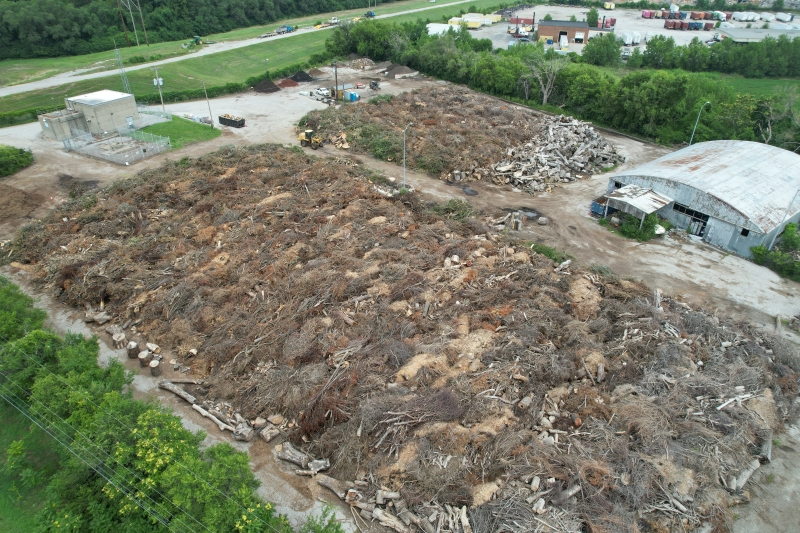Severe storms that hit the metro area in July have left significant tree loss and damage in their wake. As cities and cleanup crews continue to address the aftermath, yard waste sites are overwhelmed with fallen trees and branches.
Dealing with the aftermath of a storm is never easy and often comes with a hefty cost. Greenability took a closer look at what happens to fallen trees after a storm.
In most cases, the fallen trees are processed locally and turned into mulch. This local processing not only reduces the need to import compost and mulch from other places, but also supports products that are sourced directly from Kansas City.
One of the prominent players in the metro area is Missouri Organic Recycling, which has a significant role in handling yard waste composting services. The City of Kansas City, MO, partners with Missouri Organic to manage yard waste collected during storm cleanup events, and for seasonal leaf and brush collections. Crews pick up residential waste from curbsides and deliver it to one of Missouri Organic’s locations in the metro. There are also three drop-off sites for residents’ convenience.

Missouri Organic Recycling is receiving significant tree waste after the July storms damaged trees across the metro. Photo courtesy of Missouri Organic Recycling.
Across the United States, an alarming 45 million tons of tree waste find their way to landfills and incinerators each year, according to the EPA. Fortunately, in Missouri, yard waste is banned from landfills, and Johnson County, Kansas, prohibits yard waste from entering the landfill.
Apart from Missouri Organic Recycling, other composting facilities in the metro area, such as Suburban Lawn and Garden, Waste Management, City of Olathe Composting, and the Lee’s Summit Landfill also play their part in recycling tree waste.
The Impact of Storms
The impact of the July storms has been massive on facilities like Missouri Organic. On an average day, they handle less than 1,000 yards of yard waste. However, since the July 14th storm, they have been receiving around 15,000 yards on a daily basis, according to Kevin Anderson, vice president of Missouri Organic Recycling.
To manage this surge, they have been grinding the waste for 7-8 hours each day, with the goal of making space for more storm debris and processing it into a sellable product as fast as possible.
The process involves collecting the trees and brush, and grinding it down. Then it is screened to remove the largest and smallest fractions, so that only the slivers under 3 inches long and larger than 1/2 inch remain. The resulting mulch is sold as a premium mulch, as well as colored mulches that are available at Missouri Organic locations, at Sutherlands, and are also sold to wholesalers.
The mulch is expected to be sold as a product over the next 18 months, and it is already being sold. In rare cases of excess such as after storm events, Missouri Organic collaborates with farmers who apply it to their lands.
Recycling trees as a sustainable solution
Overall, the recycling efforts and sustainable solutions for managing fallen trees after a storm can help reduce strains on landfills, create opportunities for a local, circular economy, as well as reduce greenhouse gas emissions.
In 2022, researchers from Yale University analyzed the environmental footprint of urban tree waste disposal methods in the US. They discovered that recycling tree waste could significantly decrease emissions that escape from landfills, with estimates suggesting it could be equivalent to 28% of the total agricultural emissions in the country.
Apart from producing mulch, some fallen trees that are in good condition can be given new life by being repurposed into reclaimed lumber. Urban Lumber Company, for instance, specializes in preserving high-quality lumber sourced from local trees.
To support these sustainable operations, residents can purchase mulch sourced from Kansas City trees. Supporting these initiatives can make a significant difference in building a greener and more resilient community.

Will mulch from fallen Ash trees spread Emerald Ash Borer?